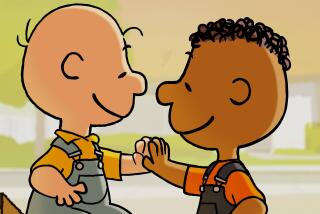50 years later, Charlie Brown turns out to be a ‘Christmas’ winner after all
When they finished making “A Charlie Brown Christmas” 50 years ago, the producers sat back and looked at their work. And they thought: Good grief.
“We just thought it was a little slow, and it was certainly not a traditional Christmas show,” said Lee Mendelson, the producer who persuaded “Peanuts” cartoonist Charles M. Schulz to adapt his popular strip about lovable loser Charlie Brown and his childhood friends into an animated holiday offering. “When you’re too close to something, you get a little worried.”
A week before the December 1965 premiere, they screened it in New York for CBS, where two executives watched in stony silence. When the lights came up, one of the bosses told Mendelson, “Well, you gave it a good try.”
SIGN UP for the free Classic Hollywood newsletter >>
That humbly received TV special is now marking an unbroken half-century of annual telecasts, becoming a leading part of pop culture’s holiday canon. In a world filled with memes, “Charlie Brown Christmas” offers a number of its own, from Linus’ blanket-improvised shepherd’s headpiece during the school play rehearsal to Snoopy’s gaudily decorated doghouse to the gang’s inimitable dance moves during the jazzy theme, “Linus and Lucy.”
ABC, which acquired the rights to “A Charlie Brown Christmas” in 2001, will precede this year’s golden-anniversary telecast on Monday, Nov. 30, with an hourlong special, “It’s Your 50th Christmas, Charlie Brown,” hosted by Kristen Bell and including original music and guest appearances by Kristin Chenoweth, Matthew Morrison, Sarah McLachlan and others.
How has an animated special that looked as destined for failure as Charlie Brown himself wound up enduring so long?
It became part of everybody’s Christmas holidays.
— Lee Mendelson, producer
“It became part of everybody’s Christmas holidays,” Mendelson, now 82, said in a recent phone interview from the Bay Area, where he still operates his production company. “It was just passed on from generation to generation.... We got this huge initial audience and never lost them.”
TV historian and researcher Tim Brooks said that the familiarity of the half-hour Peanuts special is what has helped it last, as boomer and GenX parents reintroduce the program to their own kids. And it hasn’t hurt this year that Fox’s “The Peanuts Movie” has scored at the box office, grossing more than $84 million since its Nov. 6 release.
“It’s comfort in a difficult world,” Brooks said of “Charlie Brown Christmas,” comparing the special to popular holiday music such as “White Christmas.” “I did a study once of the popular Christmas songs, and they’re almost all from the ‘40s through to the ‘60s. It’s something about their being traditional that makes them so appealing.”
But like many traditions that in retrospect seem obvious and preordained, the “Peanuts” special almost never happened.
The publicity-shy Schulz, a Midwesterner who had transplanted to Sebastopol, Calif., had previously spurned numerous TV offers to capitalize on his comic strip. “Peanuts,” which first appeared in newspapers in 1950, gradually became a cultural phenomenon, the most influential comic strip in history.
Mendelson, then a young documentary film producer, got the familiar brushoff when he called Schulz with a proposal to make a movie about his life and the creation of Peanuts. But at the end of the conversation, Mendelson mentioned that he had made a documentary about Willie Mays, the baseball great whom Schulz idolized. There was a pause.
“Well,” said Schulz, who died in 2000 at 77, “if Willie Mays can trust you with his life, maybe I can trust you with mine.”
Not long after they finished the documentary, the ad agency for Coca-Cola, which was looking for family-friendly TV shows to sponsor, called Mendelson and asked whether the team could create a Peanuts Christmas special in just six months. Mendelson replied yes, absolutely. He later said he didn’t even know at the time whether such a project would be feasible.
When he told Schulz, the cartoonist asked what the story would be. “Something you’re going to write tomorrow,” Mendelson replied.
Schulz quickly sketched a story line about Charlie Brown’s humiliating effort to direct the school Christmas play. According to David Michaelis’ 2007 biography “Schulz and Peanuts,” Mendelson, inspired by a Hans Christian Andersen short story, suggested a holiday tree be included as a plot point, and Schulz immediately warmed to the idea. Charlie Brown would adopt a sad little Christmas tree that everyone else ridiculed and try to make it the centerpiece of the school play.
At the cartoonist’s insistence, Mendelson hired Bill Melendez, a former Disney animator who had worked on the “Peanuts” characters in a series of Ford commercials. Schulz felt Melendez’s animations stayed true to the sprit and art of his creations. For music, Mendelson turned to Vince Guaraldi, an acclaimed Bay Area jazz pianist and composer. Schulz said OK even though he hated jazz. It was Guaraldi’s boogie-woogie romp “Linus and Lucy” that eventually became “Peanuts’ ” signature tune.
But two other major creative decisions led to disagreement — and also helped ensure that “Charlie Brown Christmas” remained unique in its approach to the holiday.
Schulz insisted that no laugh track be used. At the time, canned laughter was a virtual requirement for TV comedy. Mendelson pleaded that without it, the special would plod along. But Schulz detested laugh tracks and would not budge, according to the Michaelis biography.
The other standoff involved religion. The script included a climactic speech in which Linus delivered an onstage explanation of the “true meaning of Christmas” by reciting the story of Jesus’ birth according to St. Luke. Mendelson argued that religion had to be kept out of prime-time entertainment. Again, Schulz — who according to his biographer was engaged in a lifelong internal struggle over his own Christian beliefs — was insistent: “We can’t avoid it.”
Audiences quickly embraced “Charlie Brown Christmas” as a seasonal parable of redemption, well in keeping with “A Christmas Carol” and “It’s a Wonderful Life.” The premiere was seen by more than 15 million U.S. households, with 45% of TVs in use that night tuned in to the program, according to Nielsen.
CBS promptly ordered up more “Peanuts” specials, including “It’s the Great Pumpkin, Charlie Brown,” which premiered in 1966 and is now a Halloween staple.
ABC, a unit of the Walt Disney Co., sees the special as part of a long-term play.
“We value these ‘Peanuts’ specials as much as anything on our network,” said ABC Senior Vice President Robert Mills, who oversees specials for the network, adding that this year’s anniversary special underscores that commitment.
“We knew we had to do it,” he said of the new special hosted by Bell.
For Mendelson, who initially thought “Charlie Brown Christmas” was a holiday dud, the last five decades still seem surreal. But not everyone predicted that Charlie Brown would lose.
When Melendez and Mendelson confided their worries to Schulz before the 1965 premiere, he batted them away. “Don’t worry, it’s going to be fine,” he told them.
And he wasn’t the only one who thought so. “One of the animators stood up and said, ‘You guys are crazy. This is going to run for 100 years,’ ” Mendelson recalled.
“He knew better than I,” the producer added. “We’re halfway there.”
Twitter: @scottcollinsLAT
------------
‘It’s Your 50th Christmas, Charlie Brown’
Where: ABC
When: 8 p.m. Monday
Rating: TV-G (suitable for all ages)
More to Read
The complete guide to home viewing
Get Screen Gab for everything about the TV shows and streaming movies everyone’s talking about.
You may occasionally receive promotional content from the Los Angeles Times.







